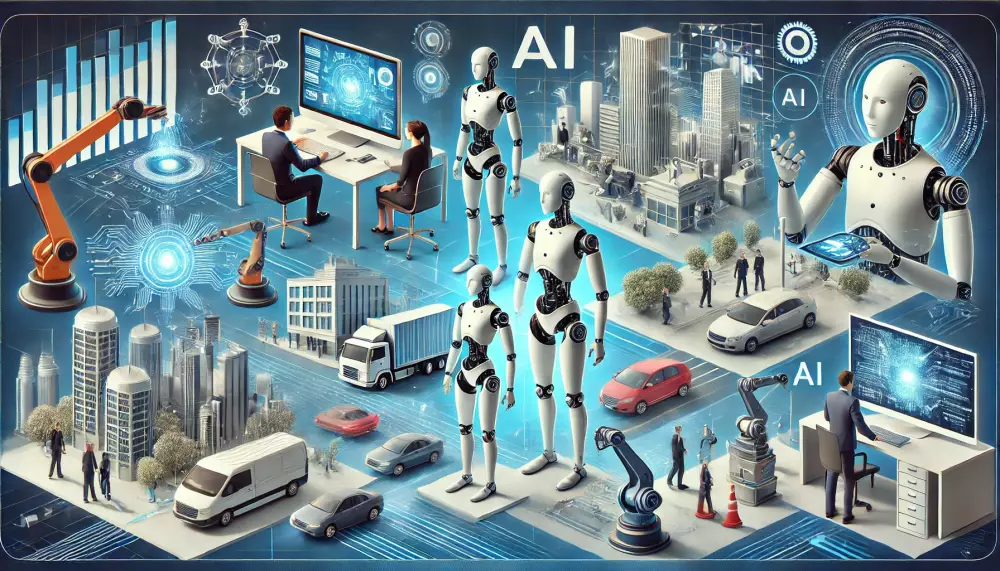
AI Agents: Transforming the Future of Work and Managing Risks
This article was collaboratively crafted by humans and AI, blending insights and precision to create a piece for your benefit. Enjoy!
In the rapidly evolving world of artificial intelligence (AI), a groundbreaking development is emerging: AI agents. These autonomous systems promise to revolutionize industries, redefine productivity, and reshape human-machine collaboration.
🚗 A Glimpse Into the Future
Imagine taking a break from work and heading to your vacation destination. As traffic builds and the weather shifts, your car’s AI agent adjusts the temperature, reroutes your journey, and even suggests a nearby café to wait out the storm.
By 2027, Deloitte predicts that half of the companies using generative AI will pilot agentic AI systems—intelligent assistants capable of handling complex tasks with minimal human intervention.
A new white paper, Navigating the AI Frontier: A Primer on the Evolution and Impact of AI Agents, co-published by Capgemini and the World Economic Forum, highlights how these systems can drive transformative change across sectors.
🤖 What Are AI Agents and How Do They Work?
AI agents, or "agentic AI," are autonomous systems designed to sense and act upon their environment to achieve specific goals. Companies like Microsoft, IBM, and OpenAI are leading the charge, with innovations such as:
- OpenAI’s Operator: Launching in January, it will automate tasks like coding and travel bookings.
- Cognition Software’s Devin: An AI-powered software engineer capable of executing complex programming via natural language prompts.
AI agents consist of core components, including:
- User Inputs: Instructions from humans.
- Environment: The digital or physical space where the agent operates.
- Sensors: Tools for perceiving the environment.
- Control Centers: Algorithms managing decision-making and planning.
- Effectors: Mechanisms for taking action, like robotic arms or digital commands.
These elements enable AI agents to perform tasks autonomously, with advanced systems capable of collaborating in multi-agent setups. For example, in a smart city, AI agents can optimize traffic flow using real-time vehicle-to-everything (V2X) communication.
🌟 The Benefits of AI Agents
AI agents bring transformative potential, including:
- Closing Skill Gaps: Addressing talent shortages by executing specialized tasks like coding or diagnostics.
- Enhanced Productivity: Performing tedious tasks at scale with speed and precision.
- Tackling Real-World Challenges: From scientific research to supply chain efficiency, AI agents are pushing boundaries in problem-solving.
Real-world applications span software development, finance, education, healthcare, and customer service. For instance, AI agents are enhancing fraud detection, personalizing education, and improving patient treatment outcomes.
⚠️ Managing the Risks of AI Agents
Despite their potential, AI agents pose risks that must be addressed to ensure ethical and effective deployment.
Key Risks:
- Technical Limitations: Errors, malfunctions, and security vulnerabilities.
- Ethical Concerns: Decision-making accountability and societal impacts.
- Socioeconomic Risks: Job displacement, over-reliance, and disempowerment.
Mitigation Strategies:
- Human-in-the-Loop Oversight: Allowing agents autonomy while keeping human experts involved in decision-making.
- Ethical Guidelines: Prioritizing human rights, privacy, and accountability.
- Data Governance: Ensuring secure and responsible data use.
- Public Awareness Campaigns: Educating users to mitigate over-reliance and foster informed interactions with AI systems.
🔮 Shaping the Future of AI
The rise of AI agents signals more than technological progress; it’s a paradigm shift in how we work and collaborate with machines. Organizations that embrace innovation while prioritizing responsible implementation will thrive in this transformative era.
As AI agents continue to evolve, balancing innovation with ethical considerations will be crucial. By doing so, businesses can unlock the full potential of these groundbreaking systems, paving the way for a future where human-machine synergy redefines success.
Written by Dev Anand from Funnel Fix It Team
